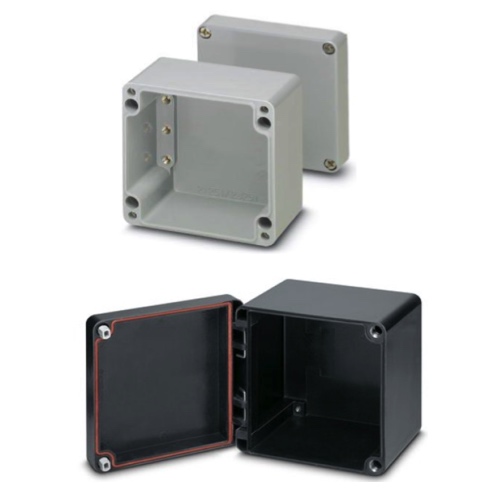Phoenix Contact Polyester Enclosures

Phoenix Contact non-metallic polyester enclosures are designed to protect electrical and electronic components in harsh industrial and outdoor environments where traditional metal enclosures may be unsuitable. These enclosures provide excellent resistance to corrosion, moisture, UV exposure, and extreme temperatures, helping ensure long-term reliability for sensitive equipment housed inside.
Available in a wide range of sizes and configurations, Phoenix Contact polyester junction boxes support diverse applications including power distribution, control systems, and field-installed electrical equipment. Many models are offered with high Ingress Protection (IP) ratings—ranging from IP66 up to IP69K—providing protection against dust, high-pressure water, and washdown conditions. Proper installation with water-resistant conduit ensures the enclosure maintains its rated level of environmental protection.
Non-metallic polyester enclosures offer additional benefits such as high electrical insulation and non-conductive construction. While components cannot be grounded directly to the enclosure, these designs still provide robust mechanical protection and tamper resistance when properly secured. Phoenix Contact enclosures can also be supplied as empty housings or configured to customer specifications to meet specific application requirements.
FAQs
Q: What are Phoenix Contact non-metallic polyester enclosures used for?
They are used to protect electrical and electronic components in environments exposed to moisture, chemicals, UV radiation, and temperature extremes.
Q: What IP ratings are available for Phoenix Contact polyester enclosures?
Phoenix Contact offers polyester enclosures with IP ratings typically ranging from IP66 to IP69K, depending on enclosure design and sealing features.
Q: Are non-metallic polyester enclosures suitable for outdoor use?
Yes, many polyester enclosures are rated NEMA 4X, making them suitable for outdoor applications requiring protection from water, dust, and corrosion.
Q: Can components be grounded to non-metallic enclosures?
No, non-metallic enclosures are non-conductive, so components cannot be grounded to the enclosure itself. Grounding must be handled separately within the system design.
Q: How does polyester compare to other non-metallic enclosure materials?
Polyester enclosures offer high impact resistance, strong chemical and moisture resistance, and good electrical insulation, making them well suited for many industrial applications.
Why Buy Phoenix Contact Non-Metallic Polyester Enclosures from RSP Supply
RSP Supply offers a comprehensive selection of Phoenix Contact non-metallic polyester enclosures and junction boxes for industrial and outdoor electrical applications. Our inventory includes multiple sizes, configurations, and protection ratings to match demanding installation requirements. Customers rely on RSP Supply for technical expertise, dependable product availability, and enclosure solutions designed for long-term environmental protection and system reliability.

